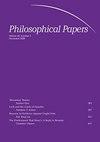A Relational Moral Theory: African Ethics in and beyond the Continent
IF 1.3
3区 哲学
0 PHILOSOPHY
引用次数: 8
Abstract
Much of what is taught in the discipline of philosophy in most universities in African countries is European philosophy. This is the reality that Thaddeus Metz met when he moved to South Africa in 1999. The moral philosophy that was taught to students at the University of Witwatersrand did not stem from the local intellectual tradition. Metz took it upon himself to read and engage with scholars about indigenous Africa with a view to seeing what contributions sub-Saharan cultures could make to contemporary debates on the study of moral philosophy. His concern was that sub-Saharan ethical philosophy had been unjustly neglected around the world. In the text, he outlines the sub-Saharan communal ethic and goes on to make the claim that African tradition grounds a moral theory that is actually more attractive than the dominant modern Western moral theories. A Relational Moral Theory consists of parts of Metz’s previously published journal articles, book chapters, and encyclopedia entries that he has reviewed and revised, and put together as a monograph. Most texts which normally consist of revised and updated pieces previously published usually come out as a patchwork of edited pieces lacking a seamless unity. In his text, Metz carefully puts together the revised previously published pieces into a coherent thesis with a smooth flow. The book consists of an introductory chapter and twelve other chapters. It is divided into three broad parts, reflecting the three branches of the arm of knowledge that deals with moral principles—ethics. Part I is located within the branch of meta-ethics and is subtitled ‘African Ethics Without a Metaphysical Gound’. Part II finds grounding in the domain of normative ethics and is subtitled ‘Communality as the Ground of African Morality’. Part III is situated within the branch of applied ethics and is subtitled ‘Communality as the Ground of Morality Simpliciter’. Part I of the book is largely methodological and consists of two chapters, Chapters 2 and 3. In these, the author outlines the method he uses; this method is important in that it runs through the rest of the book. Chapter 2 justifies the author’s favored moral theory. In the chapter, the author outlines and then dismisses the moral claims of some renowned Philosophical Papers关系道德理论:非洲大陆内外的非洲伦理
非洲国家的大多数大学在哲学学科中教授的大部分内容都是欧洲哲学。这就是撒迪乌斯·梅茨1999年搬到南非时遇到的现实。威特沃特斯兰德大学教授给学生的道德哲学并非源于当地的知识传统。梅茨主动阅读并与有关非洲土著的学者接触,以期了解撒哈拉以南文化对当代道德哲学研究的辩论有何贡献。他担心撒哈拉以南地区的伦理哲学在世界各地被不公正地忽视了。在文本中,他概述了撒哈拉以南的社区伦理,并声称非洲传统是一种道德理论的基础,这种道德理论实际上比占主导地位的现代西方道德理论更具吸引力。关系道德理论由梅茨之前发表的期刊文章、书籍章节和百科全书条目的部分组成,他对这些文章进行了审查和修订,并将其整理成专著。大多数通常由先前出版的修订和更新文章组成的文本,通常是由缺乏无缝统一的编辑文章拼凑而成的。在他的文本中,梅茨小心翼翼地将之前发表的经过修订的文章拼凑成一篇连贯流畅的论文。这本书由一个介绍性章节和其他十二个章节组成。它分为三大部分,反映了涉及道德原则的知识臂的三个分支——伦理学。第一部分位于元伦理学的分支中,副标题为“没有形而上学Gound的非洲伦理学”。第二部分立足于规范伦理领域,副标题为“作为非洲道德基础的共同性”。第三部分是应用伦理学的分支,副标题为“作为道德简化基础的公共性”。这本书的第一部分主要是方法论,由两章组成,即第二章和第三章。在这些文章中,作者概述了他使用的方法;这种方法很重要,因为它贯穿了本书的其余部分。第二章论证了作者偏爱的道德理论。在这一章中,作者概述并驳斥了一些著名哲学论文的道德主张
本文章由计算机程序翻译,如有差异,请以英文原文为准。
求助全文
约1分钟内获得全文
求助全文
来源期刊

Philosophical Papers
PHILOSOPHY-
CiteScore
2.10
自引率
0.00%
发文量
18
期刊介绍:
Philosophical Papers is an international, generalist journal of philosophy edited in South Africa Original Articles: Articles appearing in regular issues are original, high-quality, and stand-alone, and are written for the general professional philosopher. Submissions are welcome in any area of philosophy and undergo a process of peer review based on initial editor screening and refereeing by (usually) two referees. Special Issues: Topic-based special issues are comprised of both invited and submitted papers selected by guest editors. Recent special issues have included ''Philosophy''s Therapeutic Potential'' (2014, editor Dylan Futter); ''Aging and the Elderly'' (2012, editors Tom Martin and Samantha Vice); ''The Problem of the Criterion'' (2011, editor Mark Nelson); ''Retributive Emotions'' (2010, editor Lucy Allais); ‘Rape and its Meaning/s’ (2009, editor Louise du Toit). Calls for papers for upcoming special issues can be found here. Ideas for future special issues are welcome.
 求助内容:
求助内容: 应助结果提醒方式:
应助结果提醒方式:


